最新21世纪大学英语读写教程4第一单元课文中英对照
- 格式:doc
- 大小:34.00 KB
- 文档页数:9

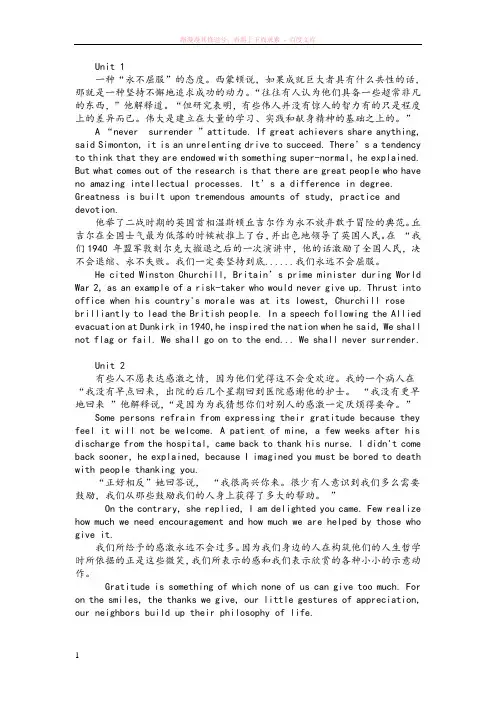
一种“永不屈服”的态度。
西蒙顿说,如果成就巨大者具有什么共性的话,那就是一种坚持不懈地追求成功的动力。
“往往有人认为他们具备一些超常非凡的东西,”他解释道。
“但研究表明,有些伟人并没有惊人的智力有的只是程度上的差异而已。
伟大是建立在大量的学习、实践和献身精神的基础之上的。
”A “never surrender ”attitude. If great achievers share anything, said Simonton, it is an unrelenting drive to succeed. There’s a tendency to think that they are endowed with something super-normal, he explained. But what comes out of the research is that there are great people who have no amazing intellectual processes. It’s a difference in degree. Greatness is built upon tremendous amounts of study, practice and devotion.他举了二战时期的英国首相温斯顿丘吉尔作为永不放弃敢于冒险的典范。
丘吉尔在全国士气最为低落的时候被推上了台,并出色地领导了英国人民。
在“我们1940 年盟军敦刻尔克大撤退之后的一次演讲中,他的话激励了全国人民,决不会退缩、永不失败。
我们一定要坚持到底......我们永远不会屈服。
He cited Winston Churchill, Britain’s prime minister during World War 2, as an example of a risk-taker who would never give up. Thrust into office when his country's morale was at its lowest, Churchill rose brilliantly to lead the British people. In a speech following the Allied evacuation at Dunkirk in 1940,he inspired the nation when he said, We shall not flag or fail. We shall go on to the end... We shall never surrender.Unit 2有些人不愿表达感激之情,因为他们觉得这不会受欢迎。
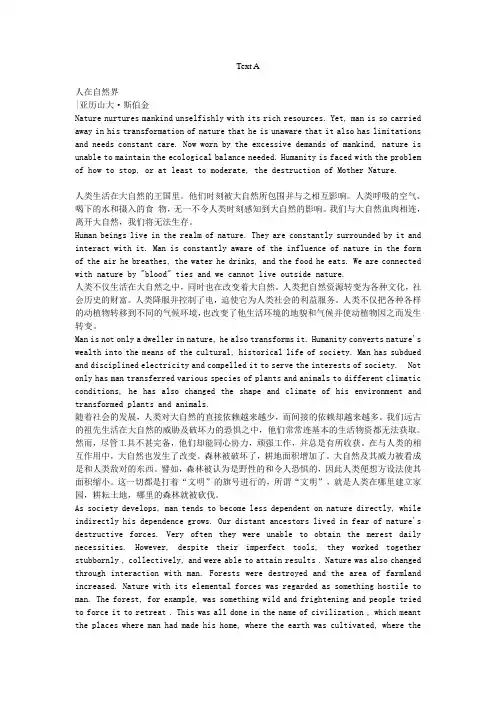
Text A人在自然界|亚历山大·斯伯金Nature nurtures mankind unselfishly with its rich resources. Yet, man is so carried away in his transformation of nature that he is unaware that it also has limitations and needs constant care. Now worn by the excessive demands of mankind, nature is unable to maintain the ecological balance needed. Humanity is faced with the problem of how to stop, or at least to moderate, the destruction of Mother Nature.人类生活在大自然的王国里。
他们时刻被大自然所包围并与之相互影响。
人类呼吸的空气、喝下的水和摄入的食物,无一不令人类时刻感知到大自然的影响。
我们与大自然血肉相连,离开大自然,我们将无法生存。
Human beings live in the realm of nature. They are constantly surrounded by it and interact with it. Man is constantly aware of the influence of nature in the form of the air he breathes, the water he drinks, and the food he eats. We are connected with nature by "blood" ties and we cannot live outside nature.人类不仅生活在大自然之中,同时也在改变着大自然。
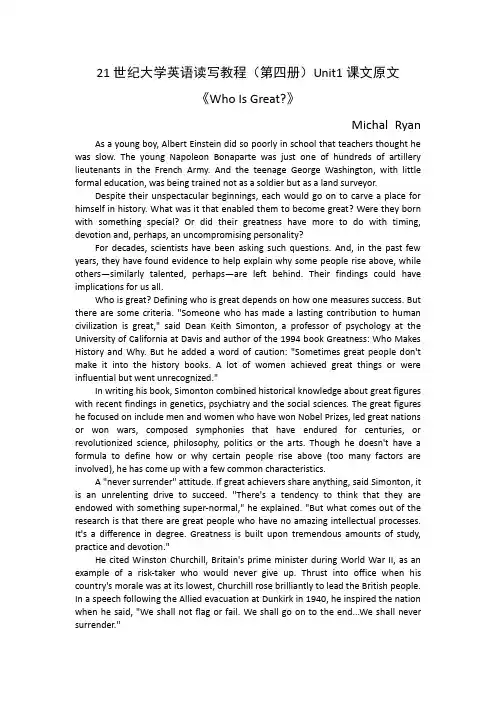
21世纪大学英语读写教程(第四册)Unit1课文原文《Who Is Great?》Michal Ryan As a young boy, Albert Einstein did so poorly in school that teachers thought he was slow. The young Napoleon Bonaparte was just one of hundreds of artillery lieutenants in the French Army. And the teenage George Washington, with little formal education, was being trained not as a soldier but as a land surveyor.Despite their unspectacular beginnings, each would go on to carve a place for himself in history. What was it that enabled them to become great? Were they born with something special? Or did their greatness have more to do with timing, devotion and, perhaps, an uncompromising personality?For decades, scientists have been asking such questions. And, in the past few years, they have found evidence to help explain why some people rise above, while others—similarly talented, perhaps—are left behind. Their findings could have implications for us all.Who is great? Defining who is great depends on how one measures success. But there are some criteria. "Someone who has made a lasting contribution to human civilization is great," said Dean Keith Simonton, a professor of psychology at the University of California at Davis and author of the 1994 book Greatness: Who Makes History and Why. But he added a word of caution: "Sometimes great people don't make it into the history books. A lot of women achieved great things or were influential but went unrecognized."In writing his book, Simonton combined historical knowledge about great figures with recent findings in genetics, psychiatry and the social sciences. The great figures he focused on include men and women who have won Nobel Prizes, led great nations or won wars, composed symphonies that have endured for centuries, or revolutionized science, philosophy, politics or the arts. Though he doesn't have a formula to define how or why certain people rise above (too many factors are involved), he has come up with a few common characteristics.A "never surrender" attitude. If great achievers share anything, said Simonton, it is an unrelenting drive to succeed. "There's a tendency to think that they are endowed with something super-normal," he explained. "But what comes out of the research is that there are great people who have no amazing intellectual processes. It's a difference in degree. Greatness is built upon tremendous amounts of study, practice and devotion."He cited Winston Churchill, Britain's prime minister during World War II, as an example of a risk-taker who would never give up. Thrust into office when his country's morale was at its lowest, Churchill rose brilliantly to lead the British people. In a speech following the Allied evacuation at Dunkirk in 1940, he inspired the nation when he said, "We shall not flag or fail. We shall go on to the end...We shall never surrender."Can you be born great? In looking at Churchill's role in history—as well as the roles of other political and military leaders—Simonton discovered a striking pattern: "Firstborns and only children tend to make good leaders in time of crisis: They're used to taking charge. But middle-borns are better as peacetime leaders: They listen to different interest groups better and make the necessary compromises. Churchill, an only child, was typical. He was great in a crisis, but in peacetime he was not effective—not even popular."Timing is another factor. "If you took George Washington and put him in the 20th century he would go nowhere as a politician," Simonton declared. "He was not an effective public speaker, and he didn't like shaking hands with the public. On the other hand, I'm not sure Franklin Roosevelt would have done well in Washington's time. He wouldn't have had the radio to do his fireside chats."Can you be too smart? One surprise among Simonton's findings is that many political and military leaders have been bright but not overly so. Beyond a certain point, he explained, other factors, like the ability to communicate effectively, become more important than innate intelligence as measured by an IQ test. The most intelligent U.S. Presidents, for example—Thomas Jefferson, Woodrow Wilson and John F. Kennedy—had a hard time getting elected, Simonton said, while others with IQs closer to the average (such as Warren G. Harding) won by landslides. While political and economic factors also are involved, having a genius IQ is not necessary to be a great leader.In the sciences, those with "genius level" IQs do have a better chance at achieving recognition, added Simonton. Yet evidence also indicates that overcoming traditional ways of thinking may be just as important.He pointed to one recent study where college students were given a set of data and were asked to see if they could come up with a mathematical relation. Almost a third did. What they did not know was that they had just solved one of the most famous scientific equations in history: the Third Law of Planetary Motion, an equation that Johannes Kepler came up with in 1618.Kepler's genius, Simonton said, was not so much in solving a mathematical challenge. It was in thinking about the numbers in a unique way—applying his mathematical knowledge to his observations of planetary motion. It was his boldness that set him apart.Love your work. As a child, Einstein became fascinated with the way magnets are drawn to metal. "He couldn't stop thinking about this stuff," Simonton pointed out. "He became obsessed with problems in physics by the time he was 16, and he never stopped working on them. It's not surprising that he made major contributions by the time he was 26.""For most of us, it's not that we don't have the ability," Simonton added, "it's that we don't devote the time. You have to put in the effort and put up with all the frustrations and obstacles."Like other creative geniuses, Einstein was not motivated by a desire for fame, said Simonton. Instead, his obsession with his work was what set him apart.Where such drive comes from remains a mystery. But it is found in nearly allcreative geniuses—whether or not their genius is acknowledged by contemporaries."Emily Dickinson was not recognized for her poetry until after her death," said Simonton. "But she was not writing for fame. The same can be said of James Joyce, who didn't spend a lot of time worrying about how many people would read Finnegans Wake."Today, researchers have evidence that an intrinsic passion for one's work is a key to rising above. In a 1985 study at Brandeis University conducted by Teresa Amabile, now a professor of business administration at Harvard University, a group of professional writers—none famous—were asked to write a short poem. Each writer was then randomly placed in one of three groups: One group was asked to keep in mind the idea of writing for money; another was told to think about writing just for pleasure; and a third group was given no instruction at all.The poems then were submitted anonymously to a panel of professional writers for evaluation. The poetry written by people who thought about writing for money ranked lowest. Those who thought about writing just for pleasure did the best. "Motivation that comes from enjoying the work makes a significant difference, "Amabile said.。
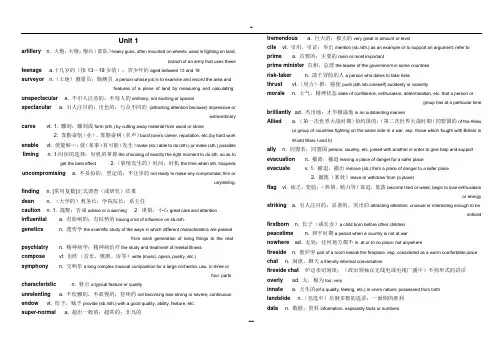
Unit 1artillery n. 火炮;大炮;炮兵(部队)heavy guns, often mounted on wheels, used in fighting on land,branch of an army that uses these teenage a.十几岁的(指13—19岁的);青少年的aged between 13 and 19surveyor n.(土地)测量员;勘测员 a person whose job is to examine and record the area andfeatures of a piece of land by measuring and calculating unspectacular a. 不引人注意的;不惊人的ordinary; not exciting or specialspectacular a. 引人注目的;出色的;与众不同的(attracting attention because) impressive orextraordinary carve vt. 1. 雕刻;雕刻成form (sth.) by cutting away material from wood or stone2. 靠勤奋创(业),靠勤奋树(名声)build (one's career, reputation, etc.)by hard work enable vt. 使能够…;使(某事)有可能(发生)make (sb.) able to do (sth.),or make (sth.) possible timing n. 1.时间的选择;时机的掌握the choosing of exactly the right moment to do sth. so as to get the best effect 2.(事情发生的)时间;时机the time when sth. happens uncompromising a. 不妥协的,坚定的;不让步的not ready to make any compromise; firm orunyielding. finding n. [常用复数]正式调查(或研究)结果dean n. (大学的)教务长;学院院长;系主任caution n. 1. 提醒;告诫advice or a warning 2. 谨慎;小心great care and attention influential a. 有影响的;有权势的having a lot of influence on sb./sth.genetics n. 遗传学the scientific study of the ways in which different characteristics are passedfrom each generation of living things to the next psychiatry n. 精神病学;精神病治疗the study and treatment of mental illnesscompose vt. 创作(音乐、歌剧、诗等)write (music, opera, poetry, etc.)symphony n. 交响乐a long complex musical composition for a large orchestra, usu. in three orfour parts characteristic n. 特点a typical feature or qualityunrelenting a. 不松懈的,不放慢的;持续的not becoming less strong or severe; continuous endow vt. 给予,赋予provide (sb./sth.) with a good quality, ability, feature, etc.super-normal a. 超出一般的;超常的;非凡的tremendous a. 巨大的;极大的very great in amount or levelcite vt. 引用,引证;举出mention (sb./sth.) as an example or to support an argument; refer toprime a. 首要的;主要的main or most importantprime minister首相,总理the leader of the government in some countriesrisk-taker n. 敢于冒险的人a person who dares to take risksthrust vt.(用力)推;强使push (sth./sb./oneself) suddenly or violentlymorale n. 士气,精神状态state of confidence, enthusiasm, determination, etc. that a person orgroup has at a particular time brilliantly ad. 杰出地;才华横溢地in an outstanding mannerAllied a. (第一次世界大战时期)协约国的;(第二次世界大战时期)同盟国的of the Allies(a group of countries fighting on the same side in a war, esp. those which fought with Britain inWorld Wars I and II)ally n. 同盟者;同盟国person, country, etc. joined with another in order to give help and supportevacuation n. 撤离;撤退leaving a place of danger for a safer placeevacuate v. 1. 撤退,撤出remove (sb.) from a place of danger to a safer place2. 撤离(某处)leave or withdraw from (a place)flag vi. 疲乏;变弱;(热情、精力等)衰退,低落become tired or weak; begin to lose enthusiasmor energy striking a. 引人注目的;显著的,突出的attracting attention; unusual or interesting enough to benoticed firstborn n. 长子(或长女)a child born before other childrenpeacetime n. 和平时期a period when a country is not at warnowhere ad. 无处;任何地方都不in, at or to no place; not anywherefireside n. 壁炉旁part of a room beside the fireplace, esp. considered as a warm comfortable placechat n. 闲谈,聊天a friendly informal conversationfireside chat 炉边亲切闲谈;(政治领袖在无线电或电视广播中)不拘形式的讲话overly ad. 太,极为too; veryinnate a. 天生的(of a quality, feeling, etc.) in one's nature; possessed from birthlandslide n.(竞选中)压倒多数的选票;一面倒的胜利data n. 数据;资料information, especially facts or numbers--equation n. 等式;方程(式)boldness n. 勇敢,无畏the state or quality of being confident and bravebold a. 勇敢的,无畏的;敢作敢为的confident and brave; daringmagnet n. 磁铁a piece of iron or other material that can attract iron, either naturally or because of anelectric current passed through it obsession n. 着迷the state of being obsessedfrustration n. 1. 灰心;丧气 2. 挫折;受挫contemporary n. 同代人;(几乎)同年龄的人a person who lives or lived at the same timeas another, usu. being roughly the same agea. 属于同一时代的;当代的;现代的belong to the same time; of the present time; modern poetry n. [总称]诗poems collectively or in generalintrinsic a. 固有的;本质的;内在的(of a value or quality) belonging naturally to sb./sth.; existingwithin sb./sth., rather than coming from outside randomly ad. 任意地,胡乱地without method or conscious choicesubmit vt. 提交,呈递give (sth.) to sb./sth. so that it may be formally considered or so that a decisionabout it may be made anonymously ad. 用匿名的方式without revealing one's namepanel n. (由专家组成的)专门小组evaluation n. 评价,评估the act of assessing or forming an idea of the amount, quality or value ofsb./sth. have (sth., nothing, a lot, etc.) to do with sb./sth.与某人/某事有(一些、毫无、很大)关系be connected or concerned with sb./sth. to the extent specified make history be or do sth. so important or unusual that it will be recorded in history创造历史,影响历史的进程;做出值得纪念(或载入史册的)事情rise above 取得成功;出类拔萃become successful or outstandingleave behind 把…丢在后面;超过cause to lag behind; surpassfocus on 集中于;着重于concentrate onbe endowed with 天生具有naturally have a good quality, ability, feature, etc.come out of 从…中获得;从…中发展而来originate in or develop frombuild...upon 把…建立在…上base ... on; use (sth.) as a foundation for further progresstake charge 掌管;负责take control (of sth.); be responsible (for sth.)go / get nowhere 不能成功;无进展achieve no success or make no progressset ... apart 使显得突出,使显得与众不同make (sb./sth.) different from or superior to others put up with 忍受,容忍tolerate or bear (sb./sth.)--。
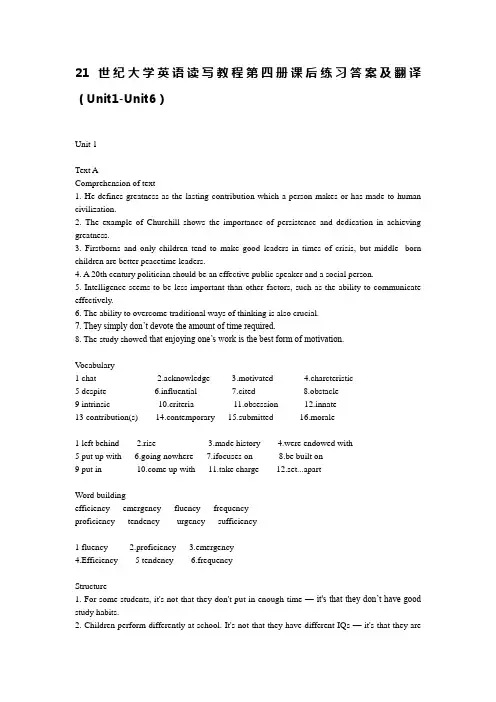
21世纪大学英语读写教程第四册课后练习答案及翻译(Unit1-Unit6)Unit 1Text AComprehension of text1. He defines greatness as the lasting contribution which a person makes or has made to human civilization.2. The example of Churchill shows the importance of persistence and dedication in achieving greatness.3. Firstborns and only children tend to make good leaders in times of crisis, but middle- born children are better peacetime leaders.4. A 20th century politician should be an effective public speaker and a social person.5. Intelligence seems to be less important than other factors, such as the ability to communicate effectively.6. The ability to overcome traditional ways of thinking is also crucial.7. They simply don‟t devote the amount of time required.8. The study showe d that enjoying one‟s work is the best form of motivation.V ocabulary1 chat 2.acknowledge 3.motivated 4.charcteristic5 despite 6.influential 7.cited 8.obstacle9 intrinsic 10.criteria 11.obsession 12.innate13 contribution(s) 14.contemporary 15.submitted 16.morale1 left behind 2.rise 3.made history 4.were endowed with5 put up with 6.going nowhere 7.ifocuses on 8.be built on9 put in e up with 11.take charge 12.set...apartWord buildingefficiency emergency fluency frequencyproficiency tendency urgency sufficiency1 fluency 2.proficiency 3.emergency4.Efficiency 5 tendency 6.frequencyStructure1. For some students, it's not that they don't put in enough time —it's that they don‟t have good study habits.2. Children perform differently at school. It's not that they have different IQs — it's that they arebrought up in different environments.3. The company is not very productive. It's not that its staff aren't talented — it's that their energy hasn't been channeled effectively.4. I‟m really sorry. It's not that I don't want to go to the cinema with you— it's that I have to finish my paper tonight.5. You have a stomachache. It's not that the food was bad — it's probably that you have too much stress from your work.1. President Wilson didn't try to bring the US back to economic and political isolation. Instead, he believed in international cooperation through an association of nations.puters don't teach students in groups. Instead, they can help them learn effectively according to their different needs.3. We shouldn't focus on minor points. Instead, we should try to solve the problem of the greatest urgency at present.4. He doesn‟t get anybody else to help him. Instead, he likes to attend to everything himself.5. Teaching success shouldn't be measured by the scores the students receive on tests. Instead, it should be measured by whether the students have internalized the ability and desire to learn. Close1-5 BCBAD6-10 DCABA11-15 DABCATransition西蒙顿说,如果事业上取得巨大成就者具有什么共性的话,那就是一种持续不断地追求成功的动力。
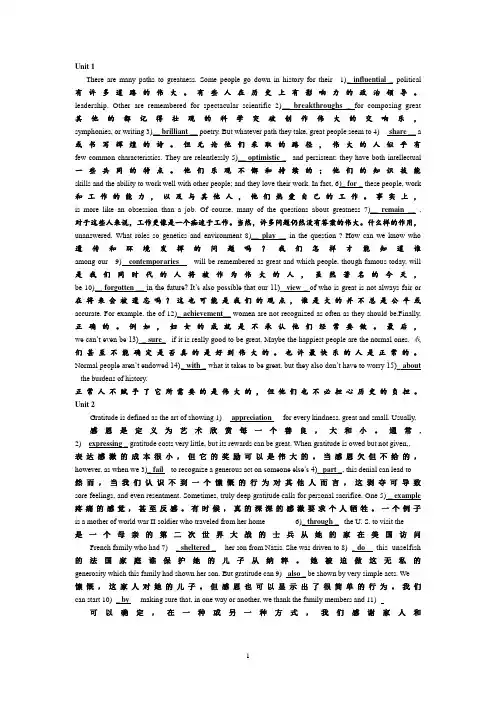
Unit 1There are many paths to greatness. Some people go down in history for their 1)_ influential _political 有许多道路的伟大。
有些人在历史上有影响力的政治领导。
leadership. Other are remembered for spectacular scientific 2)__ breakthroughs _ for composing great 其他的都记得壮观的科学突破创作伟大的交响乐,symphonies, or writing 3)__ brilliant __ poetry. But whatever path they take, great people seem to 4)__ share __ a 或书写辉煌的诗。
但无论他们采取的路径,伟大的人似乎有few common characteristics. They are relentlessly 5)__ optimistic __ and persistent; they have both intellectual 一些共同的特点。
他们乐观不懈和持续的;他们的知识技能skills and the ability to work well with other people; and they love their work. In fact, 6)_ for _ these people, work 和工作的能力,以及与其他人,他们热爱自己的工作。
事实上,is more like an obsession than a job. Of course, many of the questions about greatness 7)__ remain __, 对于这些人来说,工作更像是一个痴迷于工作。
当然,许多问题仍然没有答案的伟大。
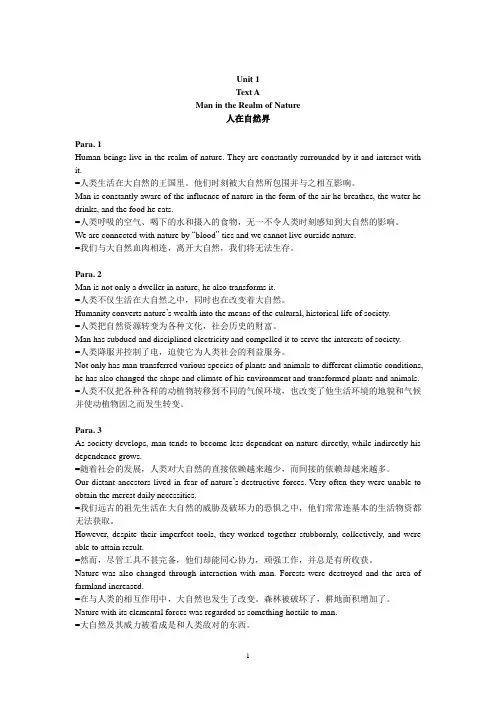
Unit 1Text AMan in the Realm of Nature人在自然界Para. 1Human beings live in the realm of nature. They are constantly surrounded by it and interact with it.=人类生活在大自然的王国里。
他们时刻被大自然所包围并与之相互影响。
Man is constantly aware of the influence of nature in the form of the air he breathes, the water he drinks, and the food he eats.=人类呼吸的空气、喝下的水和摄入的食物,无一不令人类时刻感知到大自然的影响。
We are connected with nature by “blood” ties and we cannot live ourside nature.=我们与大自然血肉相连,离开大自然,我们将无法生存。
Para. 2Man is not only a dweller in nature, he also transforms it.=人类不仅生活在大自然之中,同时也在改变着大自然。
Humanity converts nature’s wealth into the means of the cultural, historical life of society.=人类把自然资源转变为各种文化,社会历史的财富。
Man has subdued and disciplined electricity and compelled it to serve the interests of society.=人类降服并控制了电,迫使它为人类社会的利益服务。
Not only has man transferred various species of plants and animals to different climatic conditions, he has also changed the shape and climate of his environment and transformed plants and animals. =人类不仅把各种各样的动植物转移到不同的气候环境,也改变了他生活环境的地貌和气候并使动植物因之而发生转变。


21世纪大学英语读写教程第四册课后练习答案及翻译(Unit1-Unit6)Unit 1Text AComprehension of text1. He defines greatness as the lasting contribution which a person makes or has made to human civilization.2. The example of Churchill shows the importance of persistence and dedication in achieving greatness.3. Firstborns and only children tend to make good leaders in times of crisis, but middle- born children are better peacetime leaders.4. A 20th century politician should be an effective public speaker and a social person.5. Intelligence seems to be less important than other factors, such as the ability to communicate effectively.6. The ability to overcome traditional ways of thinking is also crucial.7. They simply don‟t devote the amount of time required.8. The study showe d that enjoying one‟s work is the best form of motivation.V ocabulary1 chat 2.acknowledge 3.motivated 4.charcteristic5 despite 6.influential 7.cited 8.obstacle9 intrinsic 10.criteria 11.obsession 12.innate13 contribution(s) 14.contemporary 15.submitted 16.morale1 left behind 2.rise 3.made history 4.were endowed with5 put up with 6.going nowhere 7.ifocuses on 8.be built on9 put in e up with 11.take charge 12.set...apartWord buildingefficiency emergency fluency frequencyproficiency tendency urgency sufficiency1 fluency 2.proficiency 3.emergency4.Efficiency 5 tendency 6.frequencyStructure1. For some students, it's not that they don't put in enough time —it's that they don‟t have good study habits.2. Children perform differently at school. It's not that they have different IQs — it's that they arebrought up in different environments.3. The company is not very productive. It's not that its staff aren't talented — it's that their energy hasn't been channeled effectively.4. I‟m really sorry. It's not that I don't want to go to the cinema with you— it's that I have to finish my paper tonight.5. You have a stomachache. It's not that the food was bad — it's probably that you have too much stress from your work.1. President Wilson didn't try to bring the US back to economic and political isolation. Instead, he believed in international cooperation through an association of nations.puters don't teach students in groups. Instead, they can help them learn effectively according to their different needs.3. We shouldn't focus on minor points. Instead, we should try to solve the problem of the greatest urgency at present.4. He doesn‟t get anybody else to help him. Instead, he likes to attend to everything himself.5. Teaching success shouldn't be measured by the scores the students receive on tests. Instead, it should be measured by whether the students have internalized the ability and desire to learn. Close1-5 BCBAD6-10 DCABA11-15 DABCATransition西蒙顿说,如果事业上取得巨大成就者具有什么共性的话,那就是一种持续不断地追求成功的动力。
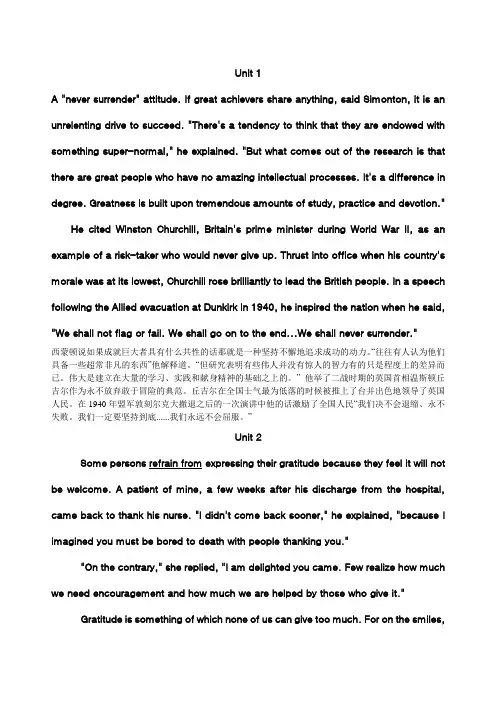
Unit 1A "never surrender" attitude. If great achievers share anything, said Simonton, it is an unrelenting drive to succeed. "There's a tendency to think that they are endowed with something super-normal," he explained. "But what comes out of the research is that there are great people who have no amazing intellectual processes. It's a difference in degree. Greatness is built upon tremendous amounts of study, practice and devotion."He cited Winston Churchill, Britain's prime minister during World War II, as an example of a risk-taker who would never give up. Thrust into office when his country's morale was at its lowest, Churchill rose brilliantly to lead the British people. In a speech following the Allied evacuation at Dunkirk in 1940, he inspired the nation when he said, "We shall not flag or fail. We shall go on to the end...We shall never surrender."西蒙顿说如果成就巨大者具有什么共性的话那就是一种坚持不懈地追求成功的动力。
Unit 1If great achievers share anything,said Simonton,it is an unrelenting drive to succeed.There's a tendency to think that they are endowed with something super-normal,he explained.But what comes out of the research is that there are great people who have no amazing intellectual processes.It's a difference in degree.Greatness is built upon tremendous amounts of study,practice and devotion.He cited Winston Churchill,Britain's prime minister during World War 2,as an example of a risk-taker who would never give up.Thrust into office when his country's morale was at its lowest,Churchill rose brilliantly to lead the British people.In a speech following the Allied evacuation at Dunkirk in 1940,he inspired the nation when he said,We shall not flag or fail.We shall go on to the end... We shall never surrender.Unit 2Some persons refrain from expressing their gratitude because they feel it will not be welcome.A patient of mine,a few weeks after his discharge from the hospital,came back to thank his nurse.I didn't come back sooner,he explained,because I imagined you must be bored to death with people thanking you.On the contrary,she replied,I am delighted you came.Few realize how much we need encouragement and how much we are helped by those who give it. Gratitude is something of which none of us can give too much.For on the smiles,the thanks we give,our little gestures of appreciation,our neighbors build up their philosophy of life.Unit3The normal Western approach to a problem is to fight it. The saying, "When the going gets tough, the tough get going," is typical of this aggressive attitude toward problem-solving. No matter what the problem is, or the techniques available for solving it, the framework produced by our Western way of thinking is fight. Dr. de Bono calls this vertical thinking; the traditional, sequential, Aristotelian thinking of logic, moving firmly from one step to the next, like toyblocks being built one on top of the other. The flaw is, of course, that if at any point one of the steps is not reached, or one of the toy blocks is incorrectly placed, then the whole structure collapses. Impasse is reached, and frustration, tension, feelings of fight take over.Lateral thinking, Dr. de Bono says, is a new technique of thinking about things —a technique that avoids this fight altogether, and solves the problem in an entirely unexpected fashion.In one of Sherlock Holmes's cases, his assistant, Dr. Watson, pointed out that a certain dog was of no importance to the case because it did not appear to have done anything. Sherlock Holmes took the opposite point of view and maintained that the fact the dog had done nothing was of the utmost significance, for it should have been expected to do something, and on this basic he solved the case.Lateral thinking sounds simple. And it is. Once you have solved a problem laterally, you wonder how you could ever have been hung up on it. The key is making that vital shift in emphasis, that sidestepping of the problem, instead of attacking it head-on.Dr. A. A. Bridger, psychiatrist at Columbia University and in private practice in New York, explains how lateral thinking works with his patients. "Many people come to me wanting to stop smoking, for instance," he says. "Most people fail when they are trying to stop smoking because they wind up telling themselves, 'No, I will not smoke; no, 1 shall not smoke; no, I will not; no, I cannot...' It's a fight and what happens is you end up smoking more.""So instead of looking at the problem from the old ways of no, and fighting it, I show them a whole new point of view—that you are your body's keeper, and your body is something through which you experience life. If you stop to think about it, there's really something helpless about your body. It can do nothing for itself. It has no choice, it is like a baby's body. You begin then a whole new way of looking at it—‘I am now going to take care of myself, and give myself some respect and protection, by not smoking.'Unit 4When a student's work did not measure up to the teacher's expectations,as often happened,the student was not treated with disappointment,anger,or annoyance.Instead,the teacher assumed that this was an exception,an accident,a bad day,a momentary slip-and the student believed her and felt reassured.The next time around,he tried harder,determined to live up to what the teacher knew he could do.The exact part of communication that tells a child,I expect the best,is difficult to pinpoint.In part it consists of a level tone showing assurance,a lack of verbal impatience,an absence of negative qualities such as irony,put-downs,and irritation.The teacher who expects the best asks her questions with conviction,knowing the answers she gets will be right,and the child picks up that conviction.Unit5I have often reflected upon the new vistas that reading opened to me. I knew right there in prison that reading had changed forever the course of my life. As I see it today, the ability to read awoke inside me some long dormant craving to be mentally alive. I certainly wasn't seeking any degree, the way a college confers a status symbol upon its students. My homemade education gave me, with every additional book that I read, a little bit more sensitivity to the deafness, dumbness, and blindness that was afflicting the black race in America. Not long ago, an English writer telephoned me from London, asking questions. One was, "What's your alma mater?" I told him, "Books." You will never catch me with a free fifteen minutes in which I'm not studying something I feel might be able to help the black man..Unit 6EQ is not the opposite of IQ.Some people are blessed with a lot of both,some with little of either.What reseachers have been trying to understand is how they complement each other,how one's ability to handle stress,for instance,affects the ability to concentrate and put intelligence to use.Among the ingredients for success,researchers now generally agree that IQ counts forabout 20%,the rest depends on everything from class to luck to the neural pathways that have developed in the brain over millions of years of human evolution.Unit 7As a child,I identified so strongly with my mother that I thought my father was just a long-term house guest with spanking privileges.She and I are bookish,introverted worriers.My father is an optimist who has never had a sleepless night in his life.Like most fathers and sons,we fought.But there was no cooling-off period between rounds.It was a cold war lasting from the onest of my adolescence untill I went off to college in 1973.I hated him.He was a former navy fighter pilot with an Irish temper and a belief that all the problems of the world-including an overprotected son who never saw anything through to completion-could be cured by the application of more discipline.翻译;21世纪英语读写教程第四册课后翻译答案Unit11.美国人往往以从事的工作来对人们进行划分。
unit1TEXTA谁是伟大的?迈克尔?赖恩阿尔伯特?爱因斯坦小时候在学校里的成绩很糟糕,老师们都认为他迟钝。
拿破仑?波拿巴年轻时只是法国陆军中几百名炮兵中尉中的一几乎没有受过正规教育的乔治?华盛顿,十几岁时不是受训当兵而是受训做土地测量员。
尽管他们的起步平淡无奇,但是每个人后来都为自己在历史上赢得了一席之地。
是什么使得他们变得伟大呢?是他们生来就具备一些特殊的东西?还是他们的伟大与时机掌握、献身精神和也许是一种坚定的个性更为有关?几十年来,科学家们一直在问这样的问题。
在过去几年里,他们已经发现了证据,这些证据有助于解释为什么有些人出类拔萃,而另外的人——也许同样很有才华——却被甩在了后面。
他们的发现可能对我们所有的人都有启示。
谁是伟大的?伟人的定义取决于如何衡量成功。
但标准还是有一些的。
“对人类文明作出永久性贡献的人是伟大的,”基思?西蒙顿院长说。
他是加州大学戴维斯分校的一名心理学教授,1994年出版的《伟大:谁创造历史,以及为什么》一书的作者。
但他又提醒说:“有时侯伟人并没有被载入史册。
许多女性取得了巨大成就,或者颇具影响力,但却没有得到承认。
”在这本书的写作中,西蒙顿把有关伟大人物的历史知识和遗传学、精神病学及社会科学领域的最新发现融合在了一起。
他所聚焦的伟人包括获得过诺贝尔奖、领导过伟大的国家或赢得过战争、谱写过流芳百世的交响乐或在科学、哲学、政治学或艺术上引起过革命性巨变的男性和女性。
虽然他没有一个公式来解释某些人怎样或为什么出类拔萃(其中涉及的因素太多了),但他却提出了一些共同的特点。
一种“永不屈服”的态度。
西蒙顿说,如果事业上取得巨大成就者具有什么共性的话,那就是一种持续不断地追求成功的动力。
“人们往往认为他们天生具有一些超常非凡的东西,”他解释道。
“但研究结果表明,有的伟人并没有惊人的智力。
有的只是程度上的差异而已。
伟大是建立在大量的学习、实践和献身精神的基础之上的。
”他举出二战时期的英国首相温斯顿?丘吉尔作为一个永不放弃的冒险者的典范。
21世纪大学英语读写教程第四册Reading_Aloud第一单元到第七单元Unit 1If great achievers share anything,said Simonton,it is an unrelenting drive to succeed.There's a tendency to think that they are endowed with something super-normal,he explained.But what comes out of the research is that there are great people who have no amazing intellectual processes.It's a difference in degree.Greatness is built upon tremendous amounts of study,practice and devotion.He cited Winston Churchill,Britain's prime minister during World War 2,as an example of a risk-taker who would never give up.Thrust into office when his country's morale was at its lowest,Churchill rose brilliantly to lead the British people.In a speech following the Allied evacuation at Dunkirk in 1940,he inspired the nation when he said,We shall not flag or fail.We shall go on to the end... We shall never surrender.Unit 2Some persons refrain from expressing their gratitude because they feel it will not be welcome.A patient of mine,a few weeks after his discharge fromthe hospital,came back to thank his nurse.I didn't come back sooner,he explained,because I imagined you must be bored to death with people thanking you. On the contrary,she replied,I am delighted you came.Few realize how much we need encouragement and how much we are helped by those who give it. Gratitude is something of which none of us can give too much.For on the smiles,the thanks we give,our little gestures of appreciation,our neighbors build up their philosophy of life.Unit 3The normal Western approach to a problem is to fight it. The say ing ,“when the going gets tough ,the tough get going,”is typical of this aggressive attitude towards problem-solving. No matter what the problem is or the techniques available for solving it, the frame work produce bu our Western way of thinking is fight. Dr.de Bono calls this vertical thinking: the traditional ,sequential, Aristotelian thinking of logic, moving firmly from one step to the next, like toy blocks is incorrectly placed ,then the whole structure collapses. Impasse is reached, and frustration, tension,feeling of fight take over.Later thinking, Dr.de Bono says, is a new technique of thinking about things—a technique that avoids this fight altogether, and solves the problem in an entirely unexpected fashion.Lateral thinking sounds simple. And it is. Once you have solved a problem laterally, you wonder how you could ever have been hung up on it. The key is making that vital shift in emphasis, that sidestepping of the problem, instead of attacking it head-on.Dr.A.A.Bridger, psychiatrist at Columbia University and in private practice in New York, explains how lateral thinking works with his patients, “Many people come to me wanting to stop smoking, for instance,”he says. “Most people fail when they are trying to stop smoking because they w ind up telling themselves,…No,I will not smoke; no, I shall not smoke; no, I will not; no, I cannot ...?”It's a fight and what happens is you end up smoking more.“So instead of looking at the problem from the old way of no, and fighting it, I show them a whole new point of view—thatyou are your body's keeper, and your body issomething though which you experience life. If you stop thinking about it, there's really something helpless about your body. It can do nothing for itself. It has no choice, it is like a baby's body. You begin then a whole new way of looking at it—…I am going to take care of myself, and give myself some respect and protection, by no smoking.?”Unit 4When a student's work did not measure up to the teacher's expectations,as often happened,the student was not treated with disappointment,anger,or annoyance.Instead,the teacher assumed that this was an exception,an accident,a bad day,a momentary slip-and the student believed her and felt reassured.The next time around,he tried harder,determined to live up to what the teacher knew he could do.The exact part of communication that tells a child,I expect the best,is difficult to pinpoint.In part it consists of a level tone showing assurance,a lack of verbal impatience,an absence of negative qualities such as irony,put-downs,and irritation.The teacherwho expects the best asks her questions with conviction,knowing the answers she gets will be right,and the child picks up that conviction.Unit 5I have often reflected upon the new vistas that reading opened to me. I knew right there in prison that reading had changed forever the course of my life. As I see it today, the ability to read awoke inside me some long dormant craving to be mentally alive. I certainly wasn't seeking any degree, the way a college confers a status symbol upon its students. My homemadeeducation gave me, with every additional book that I read, a little bit more sensitivity to the deafness that was afflicting the black race in America. Not long ago, an English writer telephoned me from London, asking questions. One was,“What's your alma matter ?”I told him,“Books.”You will never catch me with a free fifteen minutes in which I'm not studying something I feel might be able to help the black man ...Unit 6EQ is not the opposite of IQ.Some people are blessed with a lot of both,some with little ofeither.What reseachers have been trying to understand is how they complement each other,how one's ability to handle stress,for instance,affects the ability to concentrate and put intelligence to use.Among the ingredients for success,researchers now generally agree that IQ counts for about 20%,the rest depends on everything from class to luck to the neural pathways that have developed in the brain over millions of years of human evolution.Unit 7As a child,I identified so strongly with my mother that I thought my father was just a long-term house guest with spanking privileges.She and I are bookish,introverted worriers.My father is an optimist who has never had a sleepless night in his life.Like most fathers and sons,we fought.But there was no cooling-off period between rounds.It was a cold war lasting from the onest of my adolescence untill I went off to college in 1973.I hated him.He was a former navy fighter pilot with an Irish temper and a belief that all the problems of the world-including an overprotected son who never saw anything through tocompletion-could be cured by the application of more discipline.。
Who Is Great?Michael RyanAs a young boy, Albert Einstein did so poorly in school that teachers thought he was slow. The young Napoleon Bonaparte was just one of hundreds of artillery lieutenants in the French Army. And the teenage George Washington, with little formal education, was being trained not as a soldier but as a land surveyor.Despite their unspectacular beginnings, each would go on to carve a place for himself in history. What was it that enabled them to become great? Were they born with something special? Or did their greatness have more to do with timing, devotion and, perhaps, an uncompromising personality?For decades, scientists have been asking such questions. And, in the past few years, they have found evidence to help explain why some people rise above, while others—similarly talented, perhaps—are left behind. Their findings could have implications for us all.Who is great? Defining who is great depends on how one measures success. But there are some criteria. "Someone who has made a lasting contribution to human civilization is great," said Dean Keith Simonton, a professor of psychology at the University of California at Davis and author of the 1994 book Greatness: Who Makes History and Why. But he added a word of caution: "Sometimes great people don't make it into the history books.A lot of women achieved great things or were influential but went unrecognized."In writing his book, Simonton combined historical knowledge about great figures with recent findings in genetics, psychiatry and the social sciences. The great figures he focused on include men and women who have won Nobel Prizes, led great nations or won wars, composed symphonies that have endured for centuries, or revolutionized science, philosophy, politics or the arts. Though he doesn't have a formula to define how or why certain people rise above (too many factors are involved), he has come up with a few common characteristics.A "never surrender" attitude. If great achievers share anything, said Simonton, it is an unrelenting drive to succeed. "There's a tendency to think that they are endowed with something super-normal," he explained. "But what comes out of the research is that there are great people who have no amazing intellectual processes. It's a difference in degree. Greatness is built upon tremendous amounts of study, practice and devotion."He cited Winston Churchill, Britain's prime minister during World War II, as an example of a risk-taker who would never give up. Thrust into office when his country's morale was at its lowest, Churchill rosebrilliantly to lead the British people. In a speech following the Allied evacuation at Dunkirk in 1940, he inspired the nation when he said, "We shall not flag or fail. We shall go on to the end...We shall never surrender."Can you be born great? In looking at Churchill's role in history —as well as the roles of other political and military leaders—Simonton discovered a striking pattern: "Firstborns and only children tend to make good leaders in time of crisis: They're used to taking charge. But middle-borns are better as peacetime leaders: They listen to different interest groups better and make the necessary compromises. Churchill, an only child, was typical. He was great in a crisis, but in peacetime he was not effective—not even popular."Timing is another factor. "If you took George Washington and put him in the 20th century he would go nowhere as a politician," Simonton declared. "He was not an effective public speaker, and he didn't like shaking hands with the public. On the other hand, I'm not sure Franklin Roosevelt would have done well in Washington's time. He wouldn't have had the radio to do his fireside chats."Can you be too smart? One surprise among Simonton's findings is that many political and military leaders have been bright but not overly so. Beyond a certain point, he explained, other factors, like the ability to communicate effectively, become more important than innate intelligence as measured by an IQ test. The most intelligent U.S. Presidents, for example—Thomas Jefferson, Woodrow Wilson and John F. Kennedy—had a hard time getting elected, Simonton said, while others with IQs closer to the average (such as Warren G. Harding) won by landslides. While political and economic factors also are involved, having a genius IQ is not necessary to be a great leader.In the sciences, those with "genius level" IQs do have a better chance at achieving recognition, added Simonton. Yet evidence also indicates that overcoming traditional ways of thinking may be just as important.He pointed to one recent study where college students were given a set of data and were asked to see if they could come up with a mathematical relation. Almost a third did. What they did not know was that they had just solved one of the most famous scientific equations in history: the Third Law of Planetary Motion, an equation that Johannes Kepler came up with in 1618.Kepler's genius, Simonton said, was not so much in solving a mathematical challenge. It was in thinking about the numbers in a unique way—applying his mathematical knowledge to his observations of planetary motion. It was his boldness that set him apart.Love your work. As a child, Einstein became fascinated with the way magnets are drawn to metal. "He couldn't stop thinking about this stuff," Simonton pointed out. "He became obsessed with problems in physics by thetime he was 16, and he never stopped working on them. It's not surprising that he made major contributions by the time he was 26.""For most of us, it's not that we don't have the ability," Simonton added, "it's that we don't devote the time. You have to put in the effort and put up with all the frustrations and obstacles."Like other creative geniuses, Einstein was not motivated by a desire for fame, said Simonton. Instead, his obsession with his work was what set him apart.Where such drive comes from remains a mystery. But it is found in nearly all creative geniuses—whether or not their genius is acknowledged by contemporaries."Emily Dickinson was not recognized for her poetry until after her death," said Simonton. "But she was not writing for fame. The same can be said of James Joyce, who didn't spend a lot of time worrying about how many people would read Finnegans Wake."Today, researchers have evidence that an intrinsic passion for one's work is a key to rising above. In a 1985 study at Brandeis University conducted by Teresa Amabile, now a professor of business administration at Harvard University, a group of professional writers—none famous—were asked to write a short poem. Each writer was then randomly placed in one of three groups: One group was asked to keep in mind the idea of writing for money; another was told to think about writing just for pleasure; and a third group was given no instruction at all.The poems then were submitted anonymously to a panel of professional writers for evaluation. The poetry written by people who thought about writing for money ranked lowest. Those who thought about writing just for pleasure did the best. "Motivation that comes from enjoying the work makes a significant difference, "Amabile said.当阿尔伯特.爱因斯坦是个小男孩的时候,他在学校里的成绩很差,老师们都觉得他反应迟钝。
21世纪大学英语读写教程复习资料Unit11.当阿尔伯特.爱因斯坦是个小男孩的时候,他在学校里的成绩很差,老师们都觉得他反应迟钝。
拿破仑-波拿巴年轻时只是法国陆军中几百名炮兵中尉中的一名。
没有接受过什么正规教育的乔治-华盛顿,十几岁时不是受训当兵而是受训做土地测量员。
As a young boy, Albert Einstein did so poorly in school that teachers thought he was slow. The young Napoleon Bonaparte was just one of hundreds of artillery lieutenants in the French Army. And the teenage George Washington, with little formal education, was being trained not as a soldier but as a land surveyor.2.尽管他们的起步平淡无奇,但是后来个个都青史留名。
究竟是什么使他们成了伟人呢?是否他们生来就有什么特别?亦或他们的伟大与生逢其时、与献身精神,也许与一种坚定的个性更为有关?Despite their unspectacular beginnings, each would go on to carve a place for himself in history. What was it that enabled them to become great? Were they born with something special? Or did their greatness have more to do with timing, devotion and, perhaps, an uncompromising personality?3.几十年来,科学家们一直在问这样的问题。
在过去几年里,他们已经发现了一些情况,这些情况有助于解释为什么有些人出类拔萃,而另一些人----也许同样具有才华----却被抛在了后面。
他们的发现可能对我们每个人都有意义。
For decades, scientists have been asking such questions. And, in the past few years, they have found evidence to help explain why some people rise above,while others—similarly talented, perhaps—are left behind. Their findings could have implications for us all.4.谁是伟人?伟人的定义取决于如何衡量成功。
但标准还是有的。
“对人类文明做出永久性贡献的人是伟大的,”基思-西蒙顿院长说。
他是加州大学戴维斯分校的一名心理学教授,是1994年出版的《伟大:谁创造了历史,原因何在》一书的作者。
但他又提醒说:“有时候伟人并没有被载入史册。
许多女性取得了巨大成就,或者颇具影响力,但却没有得到公认。
Who is great? Defining who is great depends on how one measures success. But there are some criteria. "Someone who has made a lasting contribution to human civilization is great," said Dean Keith Simonton, a professor of psychology at the University of California at Davis and author of the 1994 book Greatness: Who Makes History and Why. But he added a word of caution: "Sometimes great people don't make it into the history books. A lot of women achieved great things or were influential but went unrecognized."5.在这本书的写作中,西蒙顿融合了关于伟大人物的历史知识以及遗传学、精神病学和社会科学领域的最新发现。
他所聚焦的伟人包括获得过诺贝尔奖、领导过伟大国家或打赢过战争、谱写过流芳百世的交响乐、或在科学、哲学、政治、艺术上引起过巨变的男女人物。
虽然他没有一个公式来解释有些人怎样或者怎么出类拔萃(涉及的因素太多了),但他却提出了一些共同的特点。
In writing his book, Simonton combined historical knowledge about great figures with recent findings in genetics, psychiatry and the social sciences. The great figures he focused on include men and women who have won NobelPrizes, led great nations or won wars, composed symphonies that have endured for centuries, or revolutionized science, philosophy, politics or the arts. Though he doesn't have a formula to define how or why certain people rise above (too many factors are involved), he has come up with a few common characteristics.6.一种“永不屈服”的态度。
西蒙顿说,如果成就巨大者具有什么共性的话,那就是一种坚持不懈地追求成功的动力。
“往往有人认为他们具备一些超常非凡的东西,”他解释道。
“但研究表明,有些伟人并没有惊人的智力,有的只是程度上的差异而已。
伟大是建立在大量的学习、实践和献身精神的基础之上的。
”A "never surrender" attitude. If great achievers share anything, said Simonton, it is an unrelenting drive to succeed. "There's a tendency to think that they are endowed with something super-normal," he explained. "But what comes out of the research is that there are great people who have no amazing intellectual processes. It's a difference in degree. Greatness is built upon tremendous amounts of study, practice and devotion."7.他举了二战时期的英国首相温斯顿-丘吉尔作为永不放弃敢于冒险的典范。
丘吉尔在全国士气最为低落的时候被推上了台,并出色地领导了英国人民。
在1940年盟军敦刻尔克大撤退之后的一次演讲中,他的话激励了全国人民,“我们决不会退缩、永不失败。
我们一定要坚持到底......我们永远不会屈服。
”He cited Winston Churchill, Britain's prime minister during World War II, as an example of a risk-taker who would never give up. Thrust into office when his country's morale was at its lowest, Churchill rose brilliantly to lead the Britishpeople. In a speech following the Allied evacuation at Dunkirk in 1940, he inspired the nation when he said, "We shall not flag or fail. We shall go on to the end...We shall never surrender."8.你会天生就伟大吗?西蒙顿经过研究丘吉尔在历史上的作用----通过研究其他政治和军事领袖的作用----发现了一个惊人的模式:“长子长女和独生子女往往会成为危难时期的优秀领导者:他们习惯于承担责任。
但是在和平时期,中间出生的人们是更好的领袖;他们更善于倾听不同利益群体的呼声,作出必需的妥协。
独生子丘吉尔就很典型。
他在危难中是伟大的,但是在和平时期却并不称职----甚至于不得人心。
”Can you be born great? In looking at Churchill's role in history—as well as the roles of other political and military leaders—Simonton discovered a striking pattern: "Firstborns and only children tend to make good leaders in time of crisis: They're used to taking charge. But middle-borns are better as peacetime leaders: They listen to different interest groups better and make the necessary compromises. Churchill, an only child, was typical. He was great in a crisis, but in peacetime he was not effective—not even popular."9.生逢其时是又一个因素。